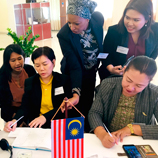 Phu Quoc (Vietnam), 21 January 2020 - Ten maritime law enforcement practitioners from Indonesia, Malaysia, the Philippines, Thailand and Vietnam, together with six international gender experts and contributors, attended the special session to the 7
th Maritime Law Enforcement Dialogue (MLED) in Southeast Asia, titled "Women in Maritime Law Enforcement" (WMLE).
Phu Quoc (Vietnam), 21 January 2020 - Ten maritime law enforcement practitioners from Indonesia, Malaysia, the Philippines, Thailand and Vietnam, together with six international gender experts and contributors, attended the special session to the 7
th Maritime Law Enforcement Dialogue (MLED) in Southeast Asia, titled "Women in Maritime Law Enforcement" (WMLE).
The event took place in the island of Phu Quoc, Vietnam, where country representatives from law enforcement agencies (coast guards, marine police, etc.) exchanged valuable ideas and experiences on the linkages between gender and law enforcement in the maritime domain. This event is part of the UNODC's Global Maritime Crime Programme (GMCP)-led series of MLEDs, aimed at facilitating and improving cooperation and collaboration between maritime law enforcement agencies in Southeast Asian states.
Given that both the law enforcement sphere and the maritime space have been traditionally regarded as occupied by men or as "masculine" domains, women in MLE face challenges in accessing and/or remaining in the field. In order to address this, the MLED brought expertise from various agencies and organizations, including the Senegalese National Agency for Maritime Affairs, INTERPOL's Maritime Security Unit, UNODC's Container Control Programme and UN Women.
Siri Bjune, GMCP's Programme Officer, stated that "UNODC and other agencies of the United Nations are committed to increasing women's engagement, participation and empowerment towards achieving Sustainable Development Goal (SDG) 5, Gender Equality, in all spheres. Maritime law enforcement is not the exception. We believe that the best way forward is bringing women themselves to raise their concerns, discuss diverse approaches and act together. The MLED provides a unique scenario for these exchanges to take place."
Some of the key challenges identified during the Dialogue highlighted that women in MLE experience tokenism, discrimination and self-discrimination, cultural and societal prejudice based on gender roles and lack of inclusive infrastructure (i.e. washrooms for women at port or on vessels). To overcome this, participants suggested potential solutions, which included increasing career opportunities for women in MLE through education, awareness-raising and promotion of positive role models, and capacity- and self-confidence-building initiatives for women in the field. Participants stated that, for these strategies to be achieved, supportive policy, legal and institutional frameworks seeking to achieve gender equality must be put in place. This would be reinforced by encouraging the enactment of WMLE networks at the national level and increasing participation at the regional level.
The event, which was held from 28 to 29 November 2019, concluded with a series of commitments to tackle these challenges in each represented country, and a way forward on the establishment of a Southeast Asian WMLE network.